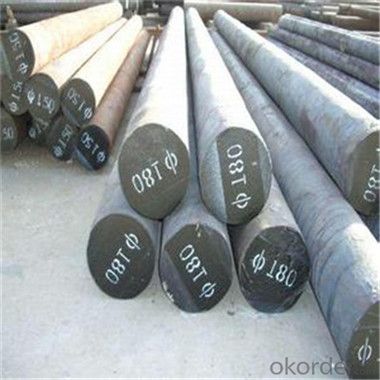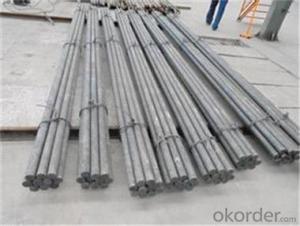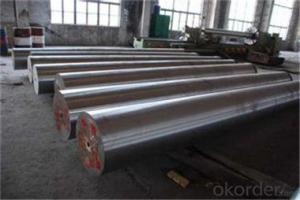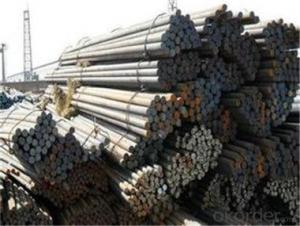HSS Steel Round Bar Alloy Round Tool Steel BarD2/H13
- Loading Port:
- Tianjin
- Payment Terms:
- TT OR LC
- Min Order Qty:
- 555 m.t.
- Supply Capability:
- 2000000 m.t./month
OKorder Service Pledge
OKorder Financial Service
You Might Also Like
Description of steel round bar:
Characteristic:Tungsten-molybdenum high speed steel developed by China,high performance in toughness ,hardness, high temperature hardness.
Festures of steel round bar:
Anneal temperature: 840-860
Relief annealing temperature: 720-760
Hardening temperature: 1210-1230
Hardening medium: salt bath under 600,aslo use oil cooling or air cooling
Normal temper temperation: 540-560 RC Rockwell Hardness after hardening and temperature: 63-66
Production Capacity: 1000 Tons/Month
Tech:EAF+LF+VD+ESR
High strength at elevated temperatures
Specifications of steel round bar:
| C | Si | Mn | W | Mo | Cr | V | P | S |
| 0.80-0.90 | 0.20-0.45 | 0.15-0.40 | 5.50-6.75 | 4.50-5.50 | 3.80-4.40 | 1.75-2.20 | ≤0.030 | ≤0.030 |
Images of steel round bar:

FAQ:
1. What is your package?
Packing situation: standard seaworthy packing or as customer required.
2. How long is the lead time?
Delivery time: 45 days after order confirmed.
3. What payment term do you accept?
Payment: T/T or L/C at sight.
- Q:What are the advantages of using silicon-alloy steel round bars?
- Silicon-alloy steel round bars offer several benefits that make them a favorable choice. Firstly, their strength and durability are exceptional, making them suitable for heavy-duty applications. Their high tensile strength allows them to withstand heavy loads and resist deformation, ensuring reliability for mechanical and structural purposes. Secondly, these round bars exhibit excellent heat resistance. The presence of silicon in the alloy enhances their ability to handle high temperatures without compromising their structural integrity. This makes them ideal for applications that involve exposure to extreme heat, such as furnace components, exhaust systems, or high-temperature equipment. Furthermore, silicon-alloy steel round bars provide remarkable corrosion resistance. The inclusion of alloying elements like chromium and nickel creates a protective oxide layer on the surface, preventing corrosion and extending their lifespan. This makes them suitable for use in corrosive atmospheres and marine environments. Additionally, these round bars offer good machinability and weldability. Their ease of forming into various shapes and sizes makes them versatile for different manufacturing processes. Moreover, their weldability allows for easy fabrication and customization, making them convenient for numerous industries. Lastly, silicon-alloy steel round bars are cost-effective. In comparison to other high-performance alloys, they are relatively more affordable, making them a cost-effective option for applications that require strength, durability, heat resistance, and corrosion resistance. In conclusion, the advantages of silicon-alloy steel round bars encompass their excellent strength and durability, good heat resistance, corrosion resistance, machinability, weldability, and cost-effectiveness. These attributes establish silicon-alloy steel as a versatile and reliable material for various industrial applications.
- Q:What are the different surface treatments available for alloy steel round bars?
- Alloy steel round bars can be subjected to various surface treatments to meet specific requirements. Some commonly used treatments include: 1. Hot-dip galvanizing: Steel bars are immersed in molten zinc, creating a protective coating that prevents rust and corrosion. 2. Electrogalvanizing: Zinc is applied to the surface of the bars using an electric current, providing a layer of protection. 3. Nitriding: Steel bars are exposed to a nitrogen-rich environment at high temperatures, resulting in a durable, wear-resistant layer that enhances strength and durability. 4. Chrome plating: A thin layer of chromium is applied to the bars, offering excellent corrosion resistance and improving the bars' aesthetic appearance. 5. Powder coating: Dry powder is applied to the bars and then cured through heating, creating a durable finish that protects against corrosion, chemicals, and UV rays. 6. Polishing: The surface of the bars is mechanically smoothed and polished, enhancing visual appeal and improving corrosion resistance. These treatments are just a few examples of the many available options for alloy steel round bars. The choice of treatment depends on specific application requirements, such as desired appearance, corrosion resistance, and wear resistance.
- Q:Are steel round bars prone to deformation?
- When steel round bars are manufactured and used correctly, they usually do not deform. Steel is recognized for its strong tensile strength and durability, which means it can resist bending or warping in normal situations. However, it is essential to remember that excessive force or mishandling can still lead to deformation in steel round bars. Overloading, improper storage, or using inappropriate machining techniques can all contribute to the bars bending or twisting. Hence, it is vital to adhere to recommended guidelines and industry standards to guarantee the durability and longevity of steel round bars.
- Q:Can steel round bars be bent or shaped?
- Certainly! Steel round bars have the capability to undergo bending and shaping. Steel, being a highly malleable material, can be formed into desired shapes through different processes. Techniques such as hot bending, cold bending, or induction bending can be employed to bend the steel. By applying force to the steel bar, it can be deformed and molded into the desired shape. Moreover, machining processes like turning, drilling, milling, or grinding can also be utilized to shape steel round bars. These processes enable the creation of various profiles, including cylindrical, square, or hexagonal shapes, among others. In summary, steel round bars provide great flexibility for bending and shaping, allowing for their versatile use in a wide range of applications.
- Q:Can steel round bars be used in the oilfield equipment industry?
- Steel round bars have a wide range of applications in the oilfield equipment industry. They are highly favored for their remarkable strength, durability, and resistance to corrosion. In fact, they are extensively utilized in the manufacturing of numerous components and equipment, including drill collars, drill bits, valves, and pump shafts. By incorporating steel round bars, the oilfield industry ensures that its equipment can endure the severe conditions and immense pressures encountered during operations. Furthermore, steel round bars can be effortlessly welded and machined to meet particular specifications, adding to their versatility and making them an optimal selection for the oilfield sector.
- Q:Can steel round bars be used for making axles?
- Certainly, axles can be crafted using steel round bars. In the realm of axle production, steel round bars are frequently employed owing to their remarkable robustness and endurance. The circular configuration of these bars bestows them with structural integrity and facilitates seamless rotation, rendering them ideal for axle applications. Moreover, steel exhibits exceptional mechanical traits, including remarkable tensile strength and impact resistance, which are paramount for axles to withstand arduous operating conditions and substantial loads. All in all, steel round bars are a dependable and widely utilized material for axle fabrication across diverse industries such as automotive, transportation, and heavy machinery.
- Q:What is the difference between a bright and a precision ground steel round bar?
- A bright steel round bar and a precision ground steel round bar are two different types of steel bars with distinct characteristics and manufacturing processes. The main difference between a bright steel round bar and a precision ground steel round bar lies in their surface finish and manufacturing tolerances. A bright steel round bar, also known as a bright mild steel bar or a bright mild steel round bar, undergoes a process called bright drawing. This process involves pulling the steel bar through a die to achieve a smooth and shiny surface finish. As a result, bright steel round bars have a highly polished appearance and a clean, smooth texture. They are commonly used in decorative applications, such as in the manufacturing of furniture, automotive accessories, and architectural elements. On the other hand, a precision ground steel round bar is manufactured with tight dimensional tolerances and precise surface finishes. These bars are typically made through the process of precision grinding, where the steel bar is machined to achieve a specific diameter and surface finish. Precision ground steel round bars are known for their accuracy and consistency in size, making them suitable for applications that require close tolerance and high precision, such as in the manufacturing of bearings, shafts, and hydraulic cylinders. In summary, the key difference between a bright steel round bar and a precision ground steel round bar lies in their surface finish and manufacturing tolerances. A bright steel bar has a polished appearance and is used primarily for decorative purposes, while a precision ground steel bar is machined to precise dimensions and is suitable for applications that require high precision and close tolerances.
- Q:What is the maximum phosphorus content allowed for steel round bars?
- The maximum phosphorus content allowed for steel round bars typically ranges from 0.04% to 0.10%.
- Q:Can steel round bars be used for making marine equipment?
- Yes, steel round bars can be used for making marine equipment. Steel is a durable and corrosion-resistant material that is commonly used in the marine industry for various applications such as shipbuilding, offshore structures, and marine equipment. However, it is important to ensure that the steel used is specifically designed for marine environments to prevent corrosion and maintain the integrity of the equipment.
- Q:What are the different types of steel round bar alloys used in the marine industry?
- In the marine industry, various types of steel round bar alloys are used due to their strength, corrosion resistance, and other specific properties required for marine applications. Some of the commonly used steel round bar alloys in the marine industry include: 1. Stainless Steel: Stainless steel, particularly grades like 316 and 304, is extensively used in the marine industry. These alloys have excellent corrosion resistance, making them suitable for marine environments where exposure to saltwater and moisture is common. Stainless steel round bars are also known for their high strength and durability. 2. Carbon Steel: Carbon steel round bars are another commonly used alloy in the marine industry. They are known for their strength and toughness, making them suitable for various marine applications. However, carbon steel is more prone to corrosion compared to stainless steel, so proper maintenance and protective coatings are necessary. 3. Duplex Stainless Steel: Duplex stainless steel round bars, such as SAF 2205, are gaining popularity in the marine industry due to their superior corrosion resistance and high strength. These alloys have a balanced microstructure of ferrite and austenite, providing excellent resistance to pitting, crevice corrosion, and stress corrosion cracking. 4. Copper-Nickel Alloys: Copper-nickel round bars, specifically alloys like 90/10 (90% copper and 10% nickel) and 70/30 (70% copper and 30% nickel), are widely used in the marine industry. These alloys offer excellent resistance to seawater corrosion, erosion, and biofouling. Copper-nickel alloys are commonly used in seawater piping systems, heat exchangers, and condensers. 5. Aluminum Alloys: Although not steel, aluminum round bars are also used in the marine industry, especially for lightweight applications. Aluminum alloys, such as 6061 and 5083, offer good corrosion resistance and high strength-to-weight ratio. They are commonly used in boat building, mast structures, and other marine components. It is important to note that the selection of steel round bar alloys in the marine industry depends on specific application requirements, environmental conditions, and budget considerations. Consulting with marine engineers and industry experts can help in choosing the most appropriate alloy for a particular marine application.
1. Manufacturer Overview |
|
|---|---|
| Location | |
| Year Established | |
| Annual Output Value | |
| Main Markets | |
| Company Certifications | |
2. Manufacturer Certificates |
|
|---|---|
| a) Certification Name | |
| Range | |
| Reference | |
| Validity Period | |
3. Manufacturer Capability |
|
|---|---|
| a)Trade Capacity | |
| Nearest Port | |
| Export Percentage | |
| No.of Employees in Trade Department | |
| Language Spoken: | |
| b)Factory Information | |
| Factory Size: | |
| No. of Production Lines | |
| Contract Manufacturing | |
| Product Price Range | |
Send your message to us
HSS Steel Round Bar Alloy Round Tool Steel BarD2/H13
- Loading Port:
- Tianjin
- Payment Terms:
- TT OR LC
- Min Order Qty:
- 555 m.t.
- Supply Capability:
- 2000000 m.t./month
OKorder Service Pledge
OKorder Financial Service
Similar products
New products
Hot products
Related keywords































